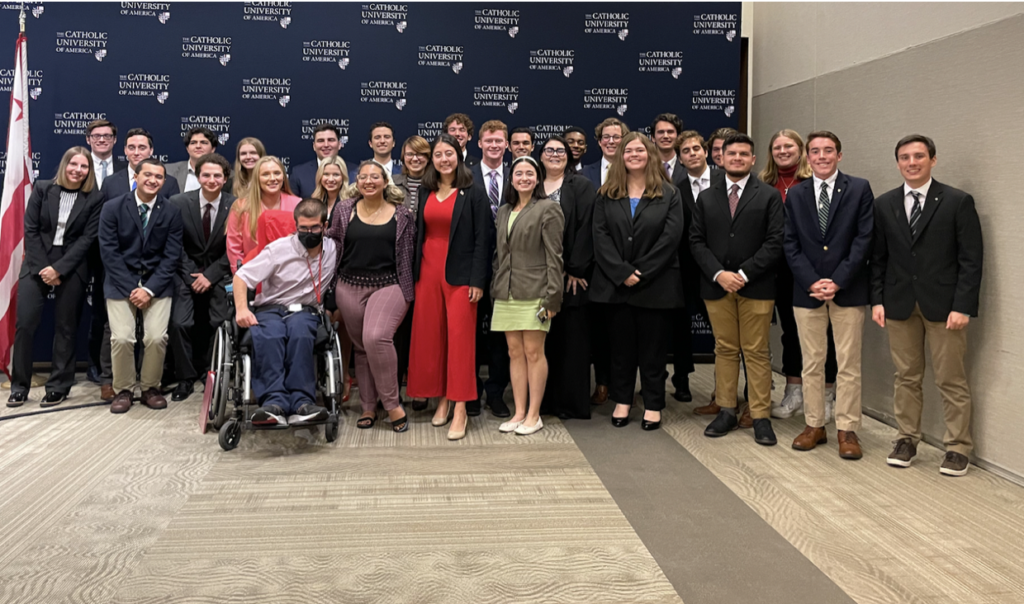Senate Meeting Back-to-Back: Two Resolutions Passed

Image Courtesy of The Catholic University of America
By Chanel Cole
On February 27, 2023, VP Fahey hit a gavel on a sound block, beginning the last senate meeting before spring break. As per usual, roll call took place and all but one senator was in attendance. After the Pledge of Allegiance and a prayer, VP Fahey transitioned the senate into the public comment portion, where the CUA community can vocalize their concerns among the senate.
Freshman Treasury Board Director Matthew Blondel encouraged the Senate to vote for the passage of the Treasury bylaws. Speaking on behalf of SGA President Tony Crnkovich, Joe Accardi supplied an update on last week’s divestment resolution, stating that the University is currently in the process of checking its solar panel vendors. Furthermore, regarding the resolution on an interfaith chapel, several University administrators are looking for a location on campus to designate for the chapel. Speaking through the president, Accardi also thanked Treasurer Karla Martinez-Victoria and the Treasury Board for their work on the bylaws that were presented that night.
Afterward, VP Fahey introduced the next speaker in the senate’s speaker series, Mr. Bill Jonas, Assistant VP of University Events and Dining Services. Speaking from his twenty years of experience at CUA, he gave advice to senate-7 that will aid them in the drafting of any future legislation. Furthermore, he commended the senate for their professionalism and commitment to serving the student body. VP Jonas expressed his relief that the senate no longer competes for authority with Program Board like it did in the past.
What remained of VP Jonas’s presentation was an addendum to the previous senate speaker’s discussion of new construction projects on campus. Jonas briefed the senate on the beginning phases of construction in the Pryzbyla Center, stating that the place would be in disarray for the next few years as it undergoes renovation. In fact, he said new outlets will be drilled in the area where the Eatery used to be during spring break.
Following his presentation, several senators had questions regarding the logistics of the mentioned construction. In particular, VP Jonas, while answering a question by Senator Foley, stated that the parking lot adjacent to McMahon Hall may be removed in the future to open up more green space for outdoor activities. On that subject, Senator Martin asked where members of the community would park if this space were removed. Jonas replied that finding parking would not be an issue, stating that the University Garage next to the Law School has about 500 spaces and has never been full during his time here. He explained that the plan to remove the parking lot is in part because the District wants Catholic to decrease its carbon footprint. Lastly, Senator Kruger asked VP Jonas for a timeline on the Pyrz construction, and he projected that the construction may not be complete until around Spring 2024.
Shifting to the next order of business, VP Fahey invited Treasurer Karla Martinez-Victoria to the podium to answer any questions the senate may have on the newly proposed Treasury bylaws. Having no questions, the senate had a vote on the bylaws, and they were unanimously passed.
The committee chairs then gave updates, sharing ideas that were in the works within their respective committees.
The next item on the agenda was the introduction of one of the two resolutions of the night, Resolution 029, which sought to encourage the use of tracking sheets for academic planning. Sponsored by Senator Bommer and cosponsored by Senators D’Atello and Drauschak, its goal is to lessen some difficulty that comes with planning out course schedules. The resolution’s sponsor stated that because many students have been assigned and reassigned CACS advisors, confusion has arisen and led to the dispelling of misinformation regarding required courses to graduate. He also stated that many academic departments, especially within the School of Arts and Sciences, do not update their websites to reflect the changes made to course requirements within that department. Senator Bommer, therefore, proposed in his resolution to promote tracking sheets and to demand that the academic schools regularly update their websites. To further this point, Senator Drauschak, a senior, shared an anecdote about how he was ill-advised and almost did not have all his credits fulfilled to walk the aisle this spring.
Following this, the resolution was ready to be debated. Senator Curioso wanted to know how the discontinuation of some majors would affect the implementation of the resolution. On this, Senator Bommer responded by stating that all current majors would be accounted for, and if ended, the tracking sheet for that major would be placed in the backrooms. Next, Senator Michels rose to praise the resolution. Senator Martin wanted to know if the resolution leaders had a specific tracking sheet in mind, like the Busch School’s tracking sheets, for example. Senator Bommer replied that the Busch School’s tracking sheets are similar to tracking sheets from other universities, asserting that they are a good model. Subsequently, Senator Musick expressed her approval of the resolution, acknowledging Bommer’s work on the resolution. She stated that as a nursing major, the tracking sheet was a great tool for her. Likewise, Senator Bubel expressed similar sentiments.
Senator Foley wanted to know the difference between dual tracking sheets compared to regular tracking sheets and Bommer explained that the dual tracking sheet shows major requirements, and the regular tracking sheet shows liberal arts requirements. The last question about the resolution came from Senator Besendorfer, asking how students with double majors from different schools would track their courses. The resolution’s sponsor stated that this was an issue he brought up to Dean Mayer and she said that students would meet up with counselors to see what steps would be best to take. Upon a vote, the resolution passed unanimously.
The second and final resolution of the night, Resolution 030, was a recreation of a resolution drafted by Senator Curioso that was previously sent back to committee through a senate vote for revisions. Now sponsored by Senator Drauschak and cosponsored by Senators Bommer, Curioso, and Musick, the resolution sought to expand epi-pen access. It calls for DPS officers to be properly trained to administer epinephrine to treat anaphylactic reactions. Senator Drauschak shared that he was pleased to have Senator Musick support this resolution on behalf of the Nursing School. Moreover, Senator Musick acknowledged that she was vocal about her disapproval of Senator Curioso’s previous resolution, but explained that this revised resolution has her full support. Following this, Senator Curioso wanted to clarify that since Drauschak had the time to meet with DPS and ask about the feasibility of the plan, Curioso saw it best that Drauschak sponsors the resolution instead of himself.
With that, the resolution was yielded to the floor for debate. Senator Kish asked when DPS would be fully trained to administer epinephrine. The resolution sponsor replied that he was not sure of a timeline but hoped for the officers to be trained by next semester. Senator Musick added that the training would only take a few hours.
A roll call vote was initiated and with all senators in favor, the resolution passed.
To conclude the meeting, Fahey gave her VP updates, thanking the Treasurer for her presentation and updating the senate on the location for future committee meetings. After she imparted her final words, an open floor was initiated, and some senators rose to make announcements on legislation they are currently working on. Following that, the last senate meeting before spring break adjourned.







